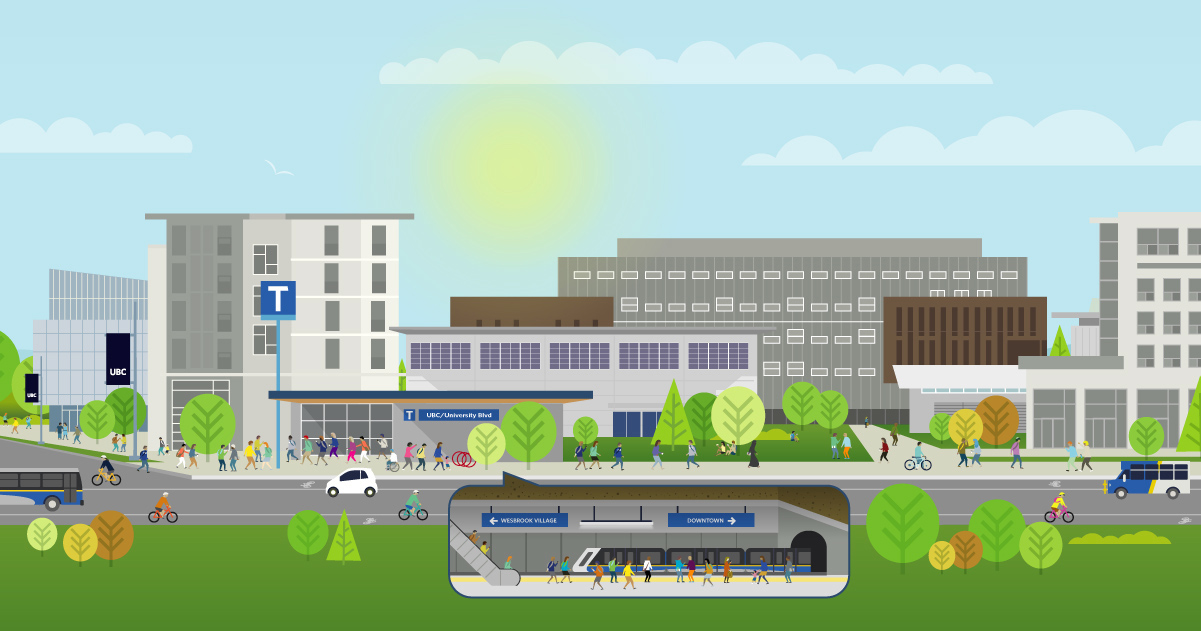UBC to advocate completion of rapid transit to campus
Building on recent news of funding for the Millennium Line Broadway Extension to Arbutus, UBC’s Board of Governors today endorsed an advocacy strategy to accelerate completion of the SkyTrain line to the university’s Point Grey campus.

Building on recent news of funding for the Millennium Line Broadway Extension to Arbutus, UBC’s Board of Governors today endorsed an advocacy strategy to accelerate completion of the SkyTrain line to the university’s Point Grey campus.
The need for improved regional transit connectivity emerged as a key theme during consultations on UBC’s new Strategic Plan and pursuing an accelerated investment in rail rapid transit to campus directly supports the plan’s three themes: collaboration, inclusion and innovation.
UBC’s Board endorsed an exploration of a direct contribution from UBC along with other partners towards the project, provided this contribution does not affect funding for UBC’s academic mission. A UBC contribution could take many forms, including: land for stations (as York University recently provided for the Toronto-York Spadina Subway expansion); charges collected from developers (as is being done by City of Richmond for the Canada Line Capstan Way station); and/or a financial contribution from new revenues enabled by rapid transit (as YVR did for the Canada Line). The amount and nature of UBC’s contribution will depend on the outcomes of technical work to understand project scope and costs, consultation with the UBC and external community, and discussions with other partners.
“Extending rail rapid transit to UBC is a key component of a regional approach to transit improvement, and directly supports UBC’s Strategic Plan. Enhanced transit connectivity between UBC and the rest of the region will benefit individuals, businesses and organizations across Metro Vancouver,” said UBC president Prof. Santa Ono. “Today’s Board approval of the advocacy strategy enables UBC to advance conversations with senior levels of government, regional partners, and with the UBC community about expediting the project.”
Regional benefits of extending rapid transit to UBC include:
- Improving affordability by opening up housing options across the line’s entire length;
- Improving travel times for people and goods along the corridor and elsewhere by reducing congestion;
- Reducing greenhouse gas emissions;
- Enhancing access to education, medical, recreational and cultural services on and off campus;
- Lowering barriers for aspiring students to access UBC from across Metro Vancouver; and
- Fostering innovation by connecting research centres like UBC with biomedical centres like Vancouver General Hospital and innovation districts at Great Northern Way and Mount Pleasant.
UBC is B.C.’s third-largest employment centre after downtown Vancouver and Central Broadway, and one of the region’s busiest transit destinations with over 1,000 buses a day.
Over the next 30 years, Metro Vancouver is expected to welcome one million more people and 600,000 new jobs. This growth will place tremendous pressure on the transportation system, economy, and environment. The region needs ambitious transportation investments to harness this long-term growth and maximize the benefits for all of Metro Vancouver.
An extension of the Millennium Line to UBC would meet this challenge by providing capacity for the next century. It would result in Canada’s longest rapid transit line, stretching 43km from UBC to Coquitlam; connecting the region’s top employment, research and academic centres and generating a wide range of social, economic and environmental benefits. Travel times for UBC commuters could drop by up to 20 to 25 minutes each way, increasing affordable housing options for students, faculty and staff across the Lower Mainland.
For more information on UBC’s transit objectives, and the regional benefits of the project please go to ubc.ca/rapidtransit



